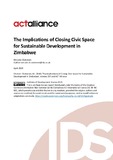| dc.description.abstract | This report on Zimbabwe is one of a set of four country case studies designed to study the implications of closing civic space for the achievement of the Sustainable Development Goals (SDGs). The case study was commissioned in response to the wave of legal, administrative, political and informal means to restrict civic space and the activities of civil society actors in countries around the world in the past decade. Based on a literature review and conceptual framework developed for the study (see also Hossain et al 2018), the report documents how changing civic space in Zimbabwe, a country characterized as a predatory authoritarian state, has impacted on development outcomes, with a focus on specific Sustainable Development Goal (SDG) outcomes, including poverty, hunger, economic development, inclusive cities, and inequality. The study found that: The ‘fit’ between civil society and the state has changed over time, from repression to cautious engagement, especially on the Constitution after 2009, but formal civil society has been weakened by years of oppression. With formal avenues for policy engagement closing after 2013, informal protest and other movements have entered the scene, enabled by the growth of digital public space; At the macro level, there are several indications that the restrictions on civic space helped allow the state to become increasingly predatory, with devastating effects on overall economic development (SDG 8), and poverty, hunger and nutrition levels (SDG 1, SDG 2); There is evidence that the Government deliberately prevented civil society from supporting Zimbabweans to address hunger and poverty, by denying or complicating access to specific areas and households within communities considered disloyal to the ruling ZANU-PF party. However, data from these hard-to-reach areas is scarce, and more fine-grained analysis of the role played by civil society in ensuring humanitarian aid delivery is needed; Extreme regional inequalities persist and deepen in part because civil society is unable to challenge corruption and the deliberate exclusion of certain populations; A period of relative openness under a Government of National Unity (GNU) saw an improvement in socio-economic policies through active engagement by civil society. The political stability and confidence in a coalition government led to re-engagement of donors, ensuring the GNU government had funds to promote recovery. At the same time, the introduction of the US dollar helped stabilize the economy and, in combination with political stability, this led to the re-engagement of investors; An indirect effect of the restricted civic space between 2000 and 2008 is that NGO and civil society lack the expertise and capacity to engage the state on macro-economic issues, to hold it accountable over public financial management - a key step towards policies to mitigate regional inequalities (SDG 10) - and so to prevent economic crises; Non-formalised civic movements that have recently emerged have mobilised around economic issues, which may have prompted the new ZANU-PF leadership to prioritise economic recovery to a certain extent. These new movements mobilise online and on the streets, and directly confronted the Government over malfunctioning and corruption. It is too early to establish how the post-2018 Zimbabwean Government is likely to address the issues of civil society and civic space. The present study offers important, albeit limited, insights into the impacts of restricted and repressed civil society on key development outcomes, and highlights the need for further analysis of the roles of civil society in priority areas such as poverty, food security, and hunger. | en |


